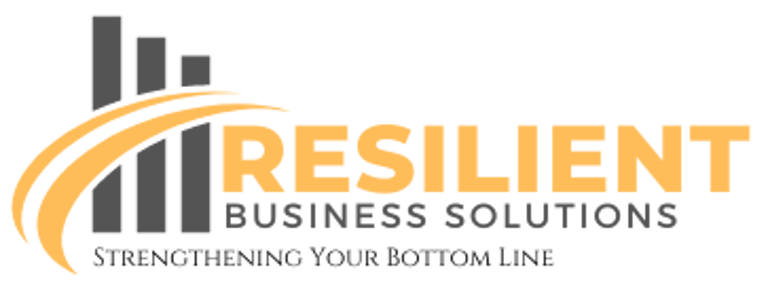5 Common Financial Mistakes Small Businesses Make and How to Avoid Them
Learn how to avoid common financial mistakes that small businesses often make, from failing to create a detailed budget to neglecting cash flow management. This post offers actionable advice on building a solid financial foundation to help your business thrive and achieve long-term success.
6 min read


Running a small business comes with its fair share of challenges, and managing finances is one of the most critical aspects to get right. Unfortunately, many small business owners make common financial mistakes that can seriously hinder growth and profitability. From failing to create a proper budget to overlooking the importance of cash flow management, these missteps can lead to bigger problems down the road.
In this post, we’ll walk through some of the most common financial mistakes that small businesses make—and, more importantly, how to avoid them.
Mistake 1: Failing to Create a Detailed Business Budget
One of the most critical missteps small businesses can make is neglecting to establish a detailed business budget. A well-structured budget serves as a roadmap for financial planning and decision-making, allowing businesses to allocate resources effectively and avoid unnecessary expenditures. Without a defined budget, organizations may find themselves overspending, resulting in cash flow dilemmas where expenses exceed income. This can severely hamper a company's ability to operate efficiently and sustainably.
To create an effective budget, one must first identify fixed and variable costs associated with the business. Fixed costs are the expenses that remain constant regardless of production or sales volumes, such as rent, salaries, and utilities. Conversely, variable costs fluctuate based on business activity, including raw materials, sales commissions, and shipping fees. Thoroughly understanding these costs ensures that a business can plan for essential expenses while also accounting for more flexible spending.
Next, estimating revenue is crucial. Small business owners must project expected income based on historical data, market analysis, and future sales forecasts. Accurate revenue predictions enable businesses to set realistic financial goals and manage cash flow efficiently. It is important to remember that conservative estimates help in maintaining a buffer for unexpected financial circumstances.
Once a budget is created, the importance of regularly reviewing it cannot be overstated. Monitoring actual performance against budgeted figures helps identify variances and understand the underlying causes. This indispensable practice contributes to informed financial decisions, enhancing the business's adaptability in a dynamic market environment. By prioritizing the establishment and maintenance of a comprehensive business budget, small business owners can effectively navigate financial challenges and position themselves for long-term success.
Mistake 2: Ignoring Cash Flow Management
Effective cash flow management is paramount for the sustainability of small businesses. Many entrepreneurs, while focusing on growth and expansion, often overlook the significance of closely monitoring their cash flow, which can lead to liquidity crises that threaten their operations. Cash flow refers to the movement of money in and out of a business, and understanding this flow is crucial for making informed financial decisions. By ignoring this vital aspect, small business owners may find themselves unable to cover expenses, respond to unexpected emergencies, or invest in opportunities for growth.
To maintain a healthy cash flow, it is essential to establish a system for tracking cash inflow and outflow. This can be achieved through regular financial reporting, which allows business owners to have a clear view of their financial standing. Implementing cash flow forecasts is another effective strategy to anticipate future cash needs and potential shortfalls. These forecasts utilize historical data and current economic conditions to project cash requirements, facilitating better planning and decision-making.
In addition to tracking and forecasting, there are practical strategies that small business owners can adopt to improve their cash flow. One such strategy is prompt invoicing; businesses should send invoices immediately upon delivering products or services. This practice expedites the payment process and reduces the time between invoicing and receiving funds.
Furthermore, managing inventory effectively plays a crucial role in cash flow management. By avoiding overstocking and ensuring that inventory levels align with demand, businesses can minimize wasted resources and free up cash that can be reinvested. Overall, embracing these practices will assist small businesses in overcoming the challenges associated with cash flow management and ensure their long-term viability.
Mistake 3: Not Separating Personal and Business Finances
One of the most critical mistakes small business owners often make is failing to separate their personal and business finances. This mix-up can lead to a myriad of complications that can hinder the growth and sustainability of the business. When personal finances are combined with business finances, it becomes challenging to accurately track business performance, which may result in poor financial decision-making.
Moreover, the blend of these two financial streams can create significant tax complications. Business-related expenses may become difficult to differentiate from personal expenses, potentially leading to erroneous tax filings and unpleasant encounters with tax authorities. Maintaining separate business accounts is essential not only for accurate bookkeeping but also to ensure compliance with tax regulations.
Utilizing accounting software can help streamline the separation of finances and provide a clear view of a business's financial health. By leveraging accounting tools, small business owners can track income and expenses with precision, thereby making informed decisions based on accurate financial reporting. This practice not only simplifies financial management but also aids in budgeting and forecasting.
In addition to financial clarity, maintaining distinct business accounts shields personal assets from business liabilities. This separation is crucial for small business owners as it offers a layer of protection in case of legal issues or debts incurred by the business. When personal and business finances intermingle, owners risk exposing their personal assets to creditors and lawsuits, which can lead to substantial financial loss.
In conclusion, the importance of separating personal and business finances cannot be overstated. By establishing separate accounts, utilizing accounting software, and understanding the ramifications for liability, small business owners can enhance their financial management, maintain accurate records, and protect personal assets effectively.
Mistake 4: Underestimating Start-up Costs
One of the most significant financial challenges faced by small business owners is the underestimation of start-up costs. Inaccurate assessments of initial expenses can lead to insufficient funding and financial strain, potentially jeopardizing the longevity of the enterprise. Small business owners often focus on immediate costs, such as inventory or equipment, while neglecting other essential expenses, thereby creating a precarious financial situation during critical early stages of operation.
A comprehensive checklist of typical start-up costs includes not only inventory and equipment but also legal fees, permits, insurance, branding, marketing, and office space. Additionally, many entrepreneurs overlook operational expenses such as utility bills, employee salaries, or technology investments that are necessary for smooth day-to-day functioning. To avoid this financial pitfall, conducting thorough market research is imperative. Gathering data on local competitors and understanding industry benchmarks can significantly enhance the accuracy of expense forecasting.
Utilizing tools such as cost estimation software can simplify the budgeting process and help to identify potential oversights in expense planning. Small business owners should engage in scenario planning, setting aside a contingency fund to manage unforeseen expenses or market fluctuations. This strategic approach not only minimizes the risk of running out of cash but also prepares the business for sustained growth during its early phases.
Lastly, securing enough funding is vital for operational stability. Entrepreneurs can explore various financing options, including personal savings, bank loans, angel investors, or crowdfunding, to ensure they have sufficient capital to cover both expected and unexpected costs. Establishing a solid financial foundation through careful planning and ample funding can empower small businesses to thrive, enabling them to navigate the uncertainties of their nascent stages effectively.
Mistake 5: Neglecting to Use Professional Financial Advice
Many small business owners often find themselves overwhelmed by the complexities of financial management, leading them to either ignore the need for professional financial advice or attempt to handle everything independently. This approach can result in costly errors, missed opportunities, and ultimately hinder the business's growth. Engaging with financial professionals can significantly enhance a company's financial health and strategic planning.
There are various types of financial experts to consider, including accountants, financial advisors, and tax professionals. An accountant can help with day-to-day financial management, ensuring accurate record-keeping and compliance with tax regulations. In contrast, financial advisors focus on long-term financial strategies, helping business owners understand investment options and retirement planning. Evaluating your business's specific needs will guide you in selecting the right professional.
One of the primary advantages of hiring a financial professional is their expertise; these individuals possess in-depth knowledge and experience that can uncover insights that may not be apparent to the average business owner. By utilizing their services, small business owners can make informed financial decisions, ultimately improving cash flow, reducing tax liabilities, and optimizing overall profitability.
Determining when to seek external assistance is crucial. Indicators may include a business experiencing rapid growth, complexities in financial reporting, or significant changes in ownership structure. Additionally, if a business owner finds themselves struggling to keep up with financial obligations, this could signal a need for professional intervention. Investing in financial advice might initially seem like an additional expense; however, the returns—through improved efficiencies, reduced risks, and smarter investment strategies—can far outweigh the costs in the long run.
Small business owners should prioritize seeking professional financial advice to avoid the pitfalls associated with managing finances independently. By leveraging the expertise of financial professionals, businesses can better navigate the financial landscape and achieve sustainable success.
Some Final Thoughts
Financial mistakes can have long-lasting consequences for any small business, but with careful planning and attention to detail, they can be avoided. By establishing a detailed budget, maintaining healthy cash flow, separating personal and business finances, accurately estimating start-up costs, and seeking professional financial advice, small business owners can strengthen their financial foundation. Avoiding these common pitfalls will not only save you from potential headaches but also position your business for sustained growth and long-term success.
When You Are Ready
Ready to simplify your business operations? At Resilient Business Solutions, we’re here to take the stress out of so many of your business tasks, so you can focus on what you do best — growing your business. Whether you need help with bookkeeping, invoicing, managing payables and receivables, content creation, or a new website design, we’ve got you covered. Contact us today to learn how we can support your business with reliable, expert services. Let’s build a resilient future together!
Strengthening Your Bottom Line
Customized financial support to empower your business success.
Get Our Free 50+ Page Small Business Success Guide Now
© 2024. All rights reserved.
